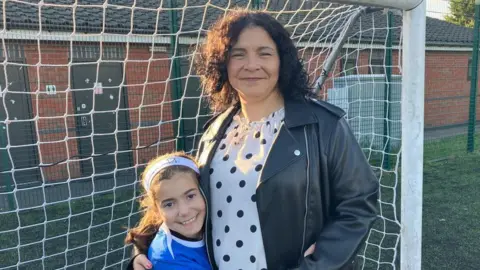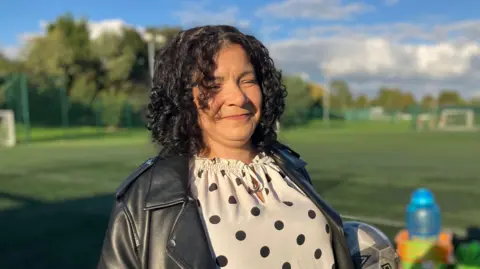'When the gene was found, I knew to get mastectomies'
 BBC
BBCImagine the choice... You're a young woman and have watched four family members across two generations become ill with breast cancer.
One is your mother, the others your maternal grandmother and two great-aunts; the latter trio having died.
Alison Cupples was 24 when she learnt she had a faulty gene linked to the cancer running through the family and had two options - have her breasts removed to help guard against the illness, or live beneath a sword that may drop at any time or never.
She opted for a full mastectomy. Her mother would die the following year having twice fought cancer.
Now aged 40, Ms Cupples, from Sutton Coldfield, has spoken of her gratitude for the research that allowed the discovery of the BRCA genes - a breakthrough that has reached its 30th anniversary milestone.
And having become a mum herself, she said such research had given her family a future.

The HR administrator had initially been given an 85% chance of developing breast cancer.
She said of her biology: "It's there no matter what I do. Finding out about [the gene] doesn't make a difference.
"[But] It meant we can take some steps to mitigate because of all the research that's been done, so I feel quite grateful."
Ms Cupples did not test alone, her sisters also underwent it.
Her elder sister found she had healthy BRCA genes.
But Ms Cupples and her younger sister both found they had inherited a faulty BRCA2 gene.
Given their family history, both decided to have full mastectomies, followed by reconstructive surgery, to reduce their risk to that of an average person.
Ms Cupples nine-year-old daughter Mila said she was happy her mum took the decision to have the procedure.
Ms Cupples added: "Seeing your mother go through it, you just don't want to go through it.
"I was I was just glad there was a way for me to go through prevention rather than a cure.
"They're not vital organs and I wanted to get rid of my risk. I'm a lot more than what my physical form is."
Now, along with Mila, she is backing a Cancer Research UK campaign to help fund more research breakthroughs on the 30th anniversary of the BRCA genes' discovery.
Paula Young from the charity said: “Together, we are beating cancer. From understanding DNA repair and helping to discover the BRCA genes to developing treatments for faulty BRCA-driven cancers, we’re making huge leaps forward thanks to the generosity of our supporters.
"So, we’re grateful to Alison for helping to highlight the enormous difference a regular income makes to our work."
Follow BBC Birmingham on BBC Sounds, Facebook, X and Instagram.
